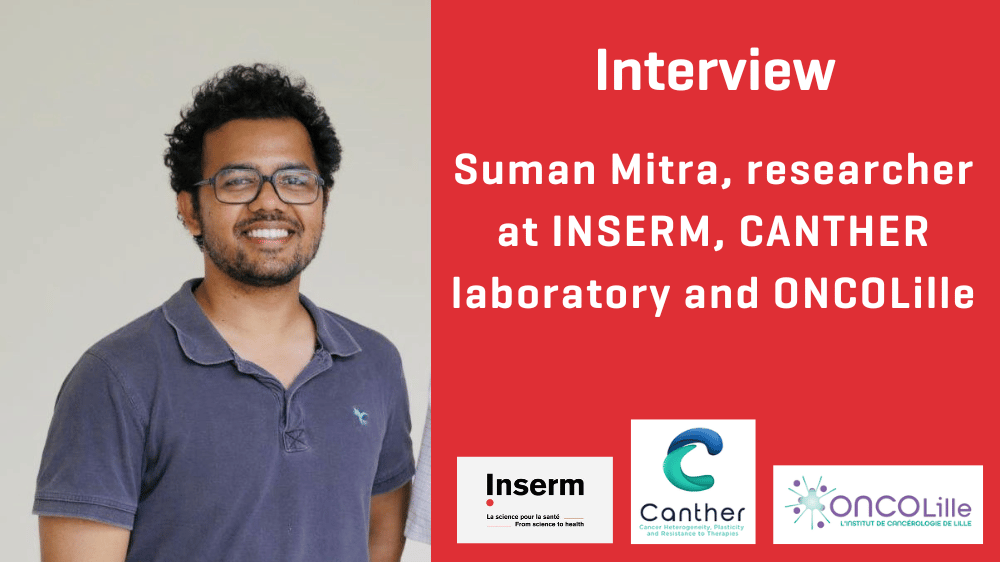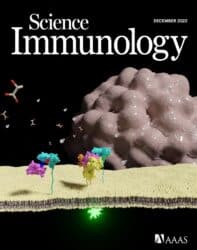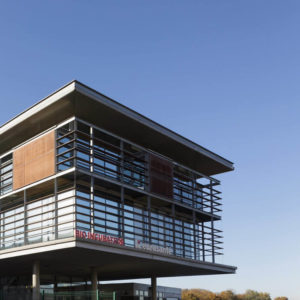Interview : Suman Mitra, researcher at INSERM, CANTHER laboratory and ONCOLille

Biotechnologist and an immunologist, Suman Mitra joined the University of Lille in 2019 and became an Inserm researcher in 2021. His research focuses on understanding and exploiting the activity of cytokines (proteins essential to the development of potent anti-tumour responses) in the tissue environment, with the aim of improving cancer therapy.
Suman Mitra coordinates a study with Dr Ignacio Moraga from the Dundee School of Life Sciences and Dr Rahul Roychoudhuri (Cambridge), which aims to design new cytokines that can resist the acidity present in the tumour environment, leading to more effective anti-tumour responses. A global discovery publicly revealed in December 2022 in Science Immunology, which opens the way to new immunotherapy treatments!
What is your background?
I am a biotechnologist and immunologist with a strong background in the field of cytokines. I have a Bachelor’s and Master’s degree in Microbiology and Biotechnology from Delhi, India and was awarded an international fellowship for my PhD at the University of Aberdeen where I studied the evolution of the adaptive immune system in vertebrates. After completing my PhD, I did a postdoctoral fellowship at the NIH where I collaborated with key opinion leaders in the field of cytokines and protein engineering. I then joined AstraZeneca as a senior scientist where I led a team of postdocs in the pre-clinical development of drugs targeting cytokines.
In 2019, I joined the University of Lille and was awarded tenure as an Inserm investigator in 2021. My current research focuses on understanding and exploiting cytokine activity in the tissue environment, with the aim of improving cytokine-based cancer therapy.
Why did you choose the Hauts-de-France region and why did you join the CANTHER team?
Moving to Lille was a personal decision, but I couldn’t be happier with the outcome. The support I received from my mentor, Pr. Bruno Quesnel, and the other leaders in the department of hematology, such as Pr. Facon, Pr. Morschhauser, and Pr. Yakoub-Agha, made me feel truly fortunate. Their guidance, along with the talent of the young scientists I was able to recruit, allowed me to establish a strong research group here in Lille.
I am grateful for the opportunities and support I have received in this region, which has led to meaningful contributions to my field of study.
What is your project/research about?
Cytokines are proteins secreted by immune cells that stimulate immune responses against cancer and pathogens. However, their therapeutic efficacy is limited by their pleiotropic effects and systemic toxicity. My research focuses on manipulating cytokine responses to better treat immune disorders via engineered cytokine surrogate ligands with tailored activities. Our current work combines protein engineering, molecular immunology, and translational immunological mouse models to manipulate cytokine responses to better treat immune disorders by engineering cytokine surrogate ligands with tailored activities. We have shown that cytokine receptors can act as ‘rheostat’ and activate graded signalling responses upon alterations of their ligand-receptor binding parameters. By taking advantage of these findings, they have engineered surrogates of several cytokine systems and improved their clinical safety by reducing their functional pleiotropy. Thus, in realizing our fundamental objective of increasing the therapeutic efficacy of cytokine-based cancer therapy, we have constructed a molecular blueprint of biasing cytokine activity to boost anti-tumor response in the tumor microenvironment
In addition, I am also working on developing new cell therapies, such as Chimeric antigen receptor (CAR)-T or CAR-NK cells, on treating cancer and other diseases. CAR T-cell therapy has shown great promise in cancer treatment, but only a small percentage of patients respond. To improve the efficacy of CAR-T therapy, I am developing synthetic cytokine receptors that prolong the proliferative capacity of the CAR-T cells and enhance their activity in the tumor microenvironment. By doing so, I aim to increase the overall therapeutic activity of the therapy and fulfill its full potential as a promising cancer immunotherapy.
What is the impact of the scientific discovery published in Science Immunology?

Cytokines play a critical role in the immune response and are essential for fighting diseases. However, their responses are often limited by the conditions they encounter in vivo. Our study shows that the activity of critical therapeutic cytokine, IL-2, is reduced in the acidic microenvironment of tumors, a common feature in many diseases. To address this challenge, we have developed a novel IL-2, termed “Switch-2”, which preferentially functions in acidic niches while exhibiting reduced activity in neutral pH. By taking into account the biochemical composition of the microenvironment, Switch-2 promises to deliver more robust anti-tumor responses with reduced systemic toxicity, a significant limitation of cytokine-based therapies. Our work presents a unique and differentiated positioning in the field of cytokine engineering, and it holds great promise for treating deadly diseases.
What are the following challenges of this discovery?
The next set of challenges for the clinical application of Switch-2 includes extensive preclinical testing and clinical trials to prove efficacy, safety, and pharmacokinetics. Manufacturing processes will need to be established to produce the drug in sufficient quantities for clinical use. In addition, further research will be needed to fully understand the mechanisms of action of Switch-2 and its optimal use in combination with other therapies. These challenges will require significant time, resources, and expertise to overcome, but the potential benefits for patients make it a worthwhile endeavor.
Besides IL-2, our team identified that a vast majority of cytokines are sensitive to acidic pH; the efforts are ongoing on identifying new pH-switchable mutants of other therapeutically relevant cytokines for the treatment of cancer and immune cell-mediated diseases.
You are currently involved in the creation of a new start-up, project in the process of incubation, how are you involved in this project? Are you more a scientist, an entrepreneur, or both?
We have received significant interest from the biotech investment community in advance of our official publication in the field of science immunology. Our collaboration with Moraga lab has resulted in the creation of a range of cytokine variants with therapeutic potential, and we recognize the potential of these tools to be developed into drugs. As a result, we are working with biotech investors to establish a start-up focusing on creating designer cytokines to treat cancer and other diseases. This exciting venture will allow us to bring our lab-based innovations to the clinic to improve patient outcomes and address the unmet needs in this field.
Regarding the question, if whether I consider myself more a scientist, an entrepreneur, or both, I am both a research scientist and an entrepreneur, as I enjoy discovering new knowledge and finding innovative ways to apply it for the betterment of patients and humanity.
How can Eurasanté's support help you in this incubation project and also in your research projects?

Eurasanté’s support can accelerate our incubation project by providing funding, mentorship, and connections while supporting our ongoing research efforts through access to resources and collaboration opportunities.
From your point of view, What are the strengths of the Hauts-de-France region and its research teams?
The Hauts-de-France region is a prime location for researchers, with a strong community and access to top talent in biology, computational science and AI. Its location between Paris, London, and Brussels, combined with its welcoming nature, makes it an ideal place to live.
To attract even more talented researchers, the region should focus on providing language support and inclusivity for non-French speaking individuals. This will create a supportive and accessible environment for researchers to excel and make a lasting impact in their field.
